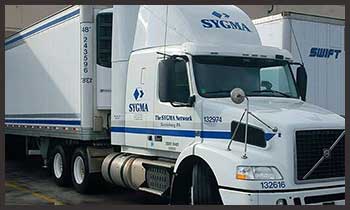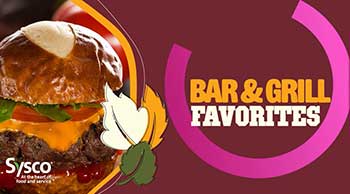When it comes to foodservice distribution giants, two names stand out – Sysco and Sygma. Both are leading players in the industry, but they also have some key differences.
This article provides an in-depth comparison of Sygma and Sysco, looking at their history, operations, strengths and weaknesses.
A Brief Comparison Table
| Category | Sysco | Sygma |
| Founded | 1969 | 1987 |
| Parent Company | Publicly traded | Wholly owned subsidiary of Sysco |
| Customers Served | Broad range including restaurants, hospitals, schools, etc. | Focused solely on large chain restaurants |
| Geographic Scale | 320+ distribution centers globally | 50+ distribution centers in U.S. |
| Product Assortment | Vast selection of food and supplies | Tailored selection focused on high-volume chain items |
| Operational Structure | Decentralized | Centralized |
| Use of Technology | Moderate investment | Specialized supply chain technology leader |
| Customer Service Model | Local sales and account management | Centralized order and account management |
| Brand Positioning | Consistent Sysco brand | Independent Sygma brand identity |
| Pricing Approach | Variable by region | Consistent national pricing with discounts for volume |
A Brief History

Sysco is the larger and older of the two companies. Founded in 1969, Sysco has grown through acquisitions to become the global leader in selling, marketing and distributing food products to restaurants, healthcare and educational facilities, lodging establishments and other foodservice customers.
Today, Sysco has annual sales of more than $52 billion and serves over 600,000 customer locations.
Sygma, on the other hand, has a more recent origin. It was founded in 1987 as a wholly owned subsidiary of Sysco focused exclusively on chain restaurant distribution. While Sysco serves all types of foodservice customers, Sygma solely supplies major chain restaurants with products and services.
This specialized focus has allowed Sygma to tailor its operations to meet the unique needs of huge restaurant chains.
Sygma And Sysco: In-depth Comparison Of Key Features
- Operational Structure
Both Sysco and Sygma have expansive distribution networks to quickly deliver products. Sysco operates over 320 distribution facilities globally. This includes 180+ locations across North America. Sygma has over 50 distribution centers in the U.S. strategically located near chain restaurant hubs.
A key difference lies in how each company is structured. Sysco operates as a decentralized corporation with distribution centers running as independent business units. This allows sites to tailor business to local markets. Sygma has centralized operations, which provides advantages like national coordination and shared best practices across locations.
The product assortment also differs. Sysco offers a vast selection of food items, supplies and related products. This ranges from fresh and frozen meats to canned goods, dairy items, fresh produce, janitorial supplies and more.
Sygma offers a streamlined, chain-friendly assortment focused on high-volume, high-turnover items like frozen burgers, fries, poultry and other quick-service restaurant staples.
- Technology Utilization

Both companies utilize technology to improve operations and customer service, but Sygma tends to push the envelope further when it comes to cutting-edge logistics tech. For example, Sygma has pioneered use of automated forecasting systems leveraging AI and machine learning algorithms to predict customer order volumes. This allows for precise inventory planning and purchasing.
Sygma also utilizes sophisticated route optimization software to plan delivery routes and capacity in real-time. This results in faster, more efficient deliveries. Sysco has recently been investing to catch up in supply chain tech capabilities, but Sygma still holds a competitive edge.
- Customer Service Approach
Sysco and Sygma also differ in their customer service models. Sysco utilizes a large sales force and local account management. This promotes high-touch, personalized service for each customer.
Sygma favors a centralized call center approach. Chain restaurant partners have dedicated Sygma account managers, but technology is leveraged to enable fast, efficient customer service. Orders can be placed digitally 24/7. Customer analytics provide insights to improve service. While Sysco touts its local relationships, Sygma aims for operational excellence and utilizing scale.
- Marketing and Brand Positioning
Sysco has maintained a largely uniform marketing presence across its various divisions and customers. Its brand positioning emphasizes exceptional food products, menu insights and operational excellence.
Sygma operates under its own brand independently from Sysco. It has carved out a unique brand identity tailored specifically to leading chain restaurants. Marketing emphasizes Sygma’s chain expertise, innovative technology and supply chain capabilities. This differentiation helps Sygma stand out in the crowded distribution marketplace.
- Pricing Models
Pricing is an area where Sygma differentiates itself as well. While Sysco offers inconsistent pricing models that vary by region and customer, Sygma provides consistent, transparent national pricing for chain clients. This simplifies purchasing and provides cost efficiency benefits thanks to Sygma’s massive scale.
Sygma pricing also favors high-volume customers. The more restaurants that a chain operates, the better the discounts they can unlock from Sygma. This perfectly aligns with the needs of rapidly expanding restaurant groups.
Pros And Cons Of Sygma
- Focused expertise on supplying chain restaurants
- Leading-edge supply chain and logistics technology
- Centralized structure enables coordination and efficiencies
- National pricing consistency and volume discounts
Cons:
- Smaller scale and operational footprint than Sysco
- More limited product assortment beyond core items
- Less personalized touch than local Sysco sales approach
Pros And Cons Of Sysco
Pros:
- Established reputation and scale as market leader
- Offers broad product selection beyond just restaurant supplies
- Local account management creates personalized service
- Flexible, decentralized structure allows customization
Cons:
- Operations not optimized for large chain clients
- Uses older technologies compared to Sygma
- Inconsistent pricing and service models across regions
Also Read: Comparison Between Us Foods And Sysco.
Frequently Asked Questions (FAQ)
Sysco is a large foodservice distribution company serving a wide range of customers globally. Sygma is a subsidiary of Sysco focused specifically on serving major chain restaurants with a specialized supply and technology model.
Yes, Sygma is fully owned by Sysco and operates as a subsidiary. However, it runs independently with its own management, branding, operations and customer base focused on chain restaurants.
Sygma offers roles in a fast-paced and technology-driven supply chain environment. Benefits include competitive pay, growth opportunities at a leading company, and work culture focused on innovation.
Sygma is the chain restaurant distribution subsidiary of Sysco. It provides customized distribution solutions exclusively to large chain restaurant companies to help them optimize supply chain efficiency.
Also Read: Comparison Between PFG And Sysco.
Conclusion
In summary, while Sysco and Sygma share some common DNA, they have evolved into distinctly different foodservice distribution models. Sysco leverages decentralization and personalized service to provide a one-stop-shop for a diverse customer base.
Sygma utilizes its specialized focus on chains to innovate distribution through centralized management and advanced technology.
Restaurant chains have unique needs for transparent national pricing, sophisticated inventory management and lightning-fast delivery. For organizations that prioritize these capabilities, partnering with Sygma presents compelling advantages. But for small, independent restaurants, Sysco remains a better fit.
Ultimately, these two leaders continue to find ways to thrive, benefiting the entire restaurant industry through innovation and expertise.
Both approaches have advantages for different customers, and the rivalry between Sysco and Sygma will only help continue pushing foodservice distribution to new heights.
